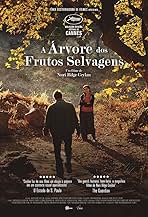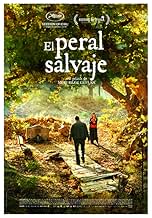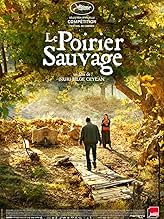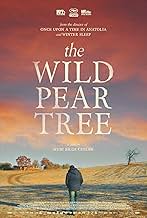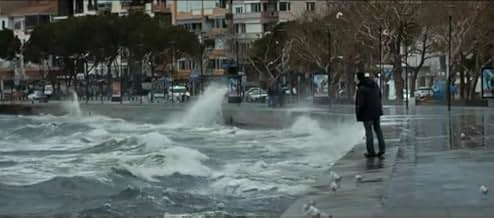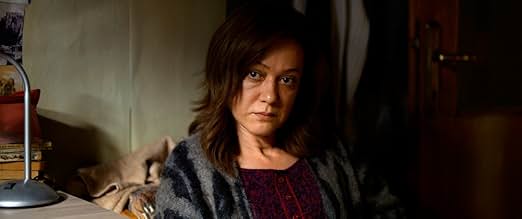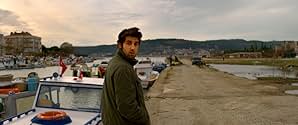Un aspirante scrittore fa ritorno al suo paese natale, dove i debiti di suo padre si riversano su di lui.Un aspirante scrittore fa ritorno al suo paese natale, dove i debiti di suo padre si riversano su di lui.Un aspirante scrittore fa ritorno al suo paese natale, dove i debiti di suo padre si riversano su di lui.
- Regia
- Sceneggiatura
- Star
- Premi
- 10 vittorie e 15 candidature totali
- Sinan Karasu
- (as Aydin Doğu Demirkol)
- Yasemin Karasu
- (as Asena Keskinci)
Recensioni in evidenza
The plot, the acting and the cinematography is simply incredible. As a guy who lives in Turkey, it's very rare to see films with a quality. So in that way, I can easily say that Ahlat Agaci is the best movie in the past 4-5 years.
What stood out for me in the film was that you basically never get bored even though the film is quite long. No unnecessary scenes, no characters that you hate everytime you see them. Definitely a thing to consider.
NBC is so undervalued and underrated, at least in his homecountry. Interestingly enough, European cinema appreciates him and he almost always participates in Cannes Film Festival, but I'm %100 sure that half of Turkey doesn't even know his name. It's sad, but it also says a lot about the general look to cinema sector in Turkey.
Thanks to people like NBC, though, we can watch 'real' and 'non-American made' films.
Quality film by an incredible director. 10/10
In his first movies Ceylan barely had a story, he only had "themes". The rest of the movie was wonderful photography and this is what he got famous for. Then, founding clever collaborations, he learnt how to tell stories as well. But the question here is: does he really have a new story to tell? Turkey has changed a lot since Kasaba, but Ceylan's representations look like they are here to stay eternally. For instance, while Ceylan still hold on to the "intellectual stuck in the countryside" stereotype, intellectuals in the Turkish countryside either made it to the metropolises or they are replaced/outdated by the emerging religious elite.
So instead of telling a new story, Ceylan seems like he chose to "garnish" what he already has, with neverending dialogues unattached to each other. Dialogue with the girl, dialogue with the mayor, with the businessman, with the writer, with the police friend, with the imams and with this and this and this. Kind of a video game, one "countryside monster" at a time. So I think this movie is a rococo remake of minimalist Kasaba.
So if you tolerate the theatrical lines in the first dialogues, the movie is a nice one to see. But in comparison to the last 2 movies of Ceylan, this is certainly a step backwards (and surprisingly, this backwardness is evident also in the photography).
Long because it's, well, long (clocking in at just over three hours). But also long because the main character, who's in virtually every frame of the movie, is such an unpleasant person to hang out with. And part of the reason that he's so unpleasant is that he's recognizable, as I've been that person myself. He's young, fresh out of college, and thinks he knows everything there is to know about life despite having almost no experience of it himself. He's cocky, condescending, and unbearable. What ultimately makes him worth spending time with, and for that matter makes the whole movie worth sticking with, is the final scene, in which he comes to understand that the father who he's shunned because of all the life mistakes he's so determined not to make himself is perhaps the one person in his life who most understands him and most emulates the ideals the son goes around shoving down everyone's throat.
This is the kind of movie I wish I had seen with someone else so I could have someone to talk about it with. Throughout the film, the protagonist has little moments of.....I'm not sure what to call them.....daydreams? hallucinations? A scene will play out one way, and the it will abruptly shift gears and play out another, leading us to believe that the first version was in the protagonist's head. I'm not sure what to make of these breaks from reality. He's written a book that he's trying to get published, so maybe these episodes are a glimpse into how events play out in his book rather than how they did in reality? Or maybe it's the reverse. Maybe the movie we're watching is the book he wrote, and these moments are what actually happened. Or maybe it's neither and I'm overthinking. Maybe he's just a writer who is always attuned to alternative paths a person's narrative might take.
The ending didn't exactly make me feel like all of the three hours preceding it were necessarily worth it. I don't know why the movie had to be quite so long. But it did linger in my head and it's made the whole movie grow in stature for me when I think back on it. I don't know that I'd want to watch it again, but I'm glad I watched it once.
Grade: A
It's very easy to find things from your own life within the story and the dialogues that occur which makes a lot of the little-longer-than-usual scenes very engaging and that makes you wonder how the dialogue is gonna develop and conclude.
I normally don't care too much about the length of movies but I'm a little bit on the negative side with this one. That's mainly because of what I told myself halfway through the movie which was; "Ohhh, we're only halfway" instead of "Yeahhh, we're only halfway".
It's about a young writer who recently finished university. He must move back to his village from the city where he went to school. So his struggles start as he doesn't want to get used to the village life.
Lo sapevi?
- QuizAccording to Nuri Bilge Ceylan, The Wild Pear Tree is about a son's unavoidable slide towards a fate resembling that of his father.
- Citazioni
Sinan Karasu: When we learn we are not so important why is our instinct to be hurt? Wouldn't it be better to treat it as a key moment of insight? We engender our own beliefs. Thus we need to believe in separation as much as in beauty and love, and to be prepared. Because rupture and separation in wait for everything beautiful. In which case, why not treat these tribulations as constructive disasters that help us pierce our own mysteries.
- ConnessioniFeatures Umutsuzlar (1971)
- Colonne sonorePassacaglia and Fugue in C minor, BWV 582
Composed by Johann Sebastian Bach
Performed by Leopold Stokowski
I più visti
- How long is The Wild Pear Tree?Powered by Alexa
Dettagli
- Data di uscita
- Paesi di origine
- Siti ufficiali
- Lingua
- Celebre anche come
- The Wild Pear Tree
- Luoghi delle riprese
- Yenice, Çanakkale, Turchia(location)
- Aziende produttrici
- Vedi altri crediti dell’azienda su IMDbPro
Botteghino
- Lordo Stati Uniti e Canada
- 34.014 USD
- Fine settimana di apertura Stati Uniti e Canada
- 4923 USD
- 3 feb 2019
- Lordo in tutto il mondo
- 1.696.258 USD
- Tempo di esecuzione3 ore 8 minuti
- Colore
- Mix di suoni
- Proporzioni
- 2.39 : 1
Contribuisci a questa pagina



